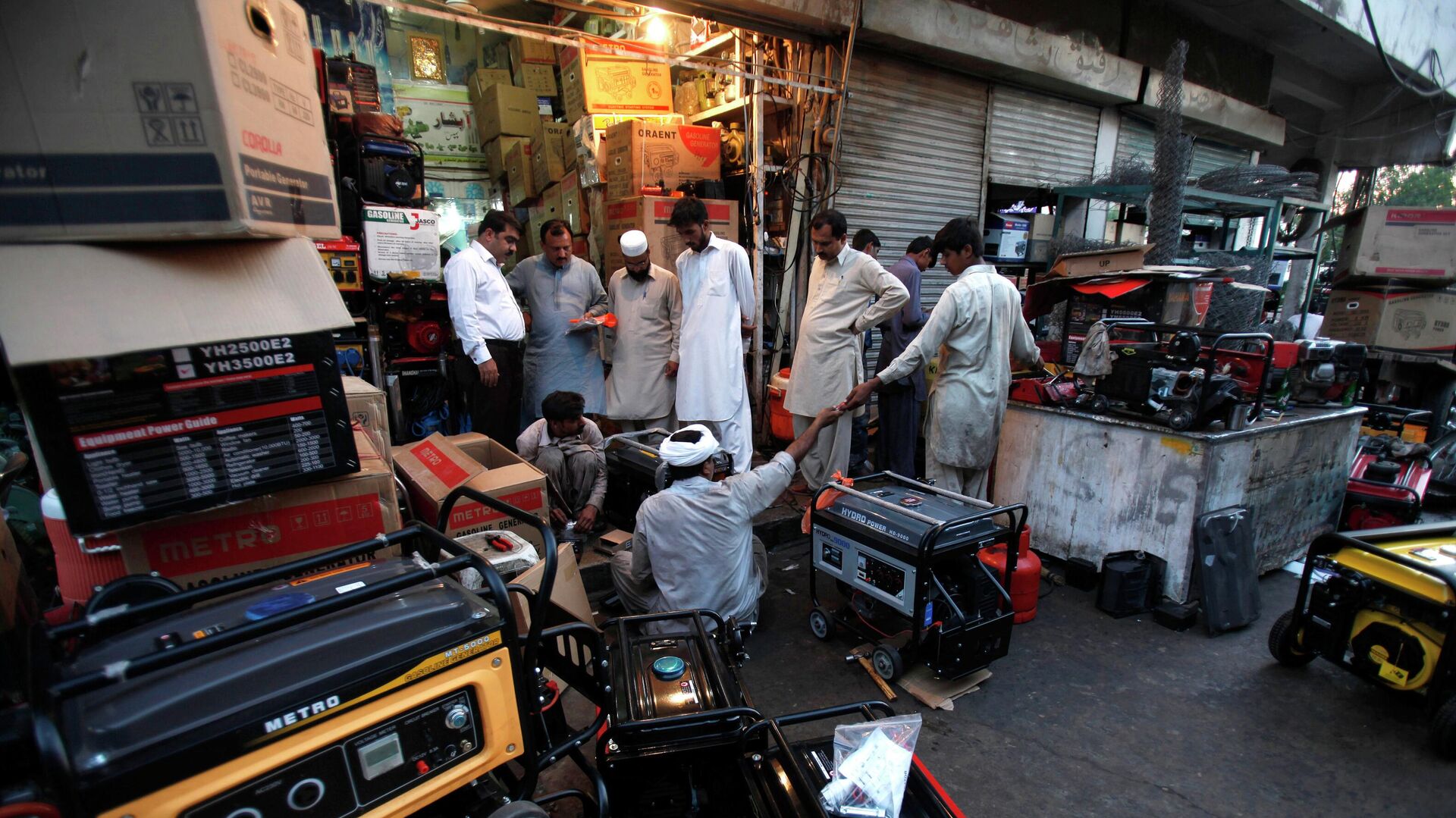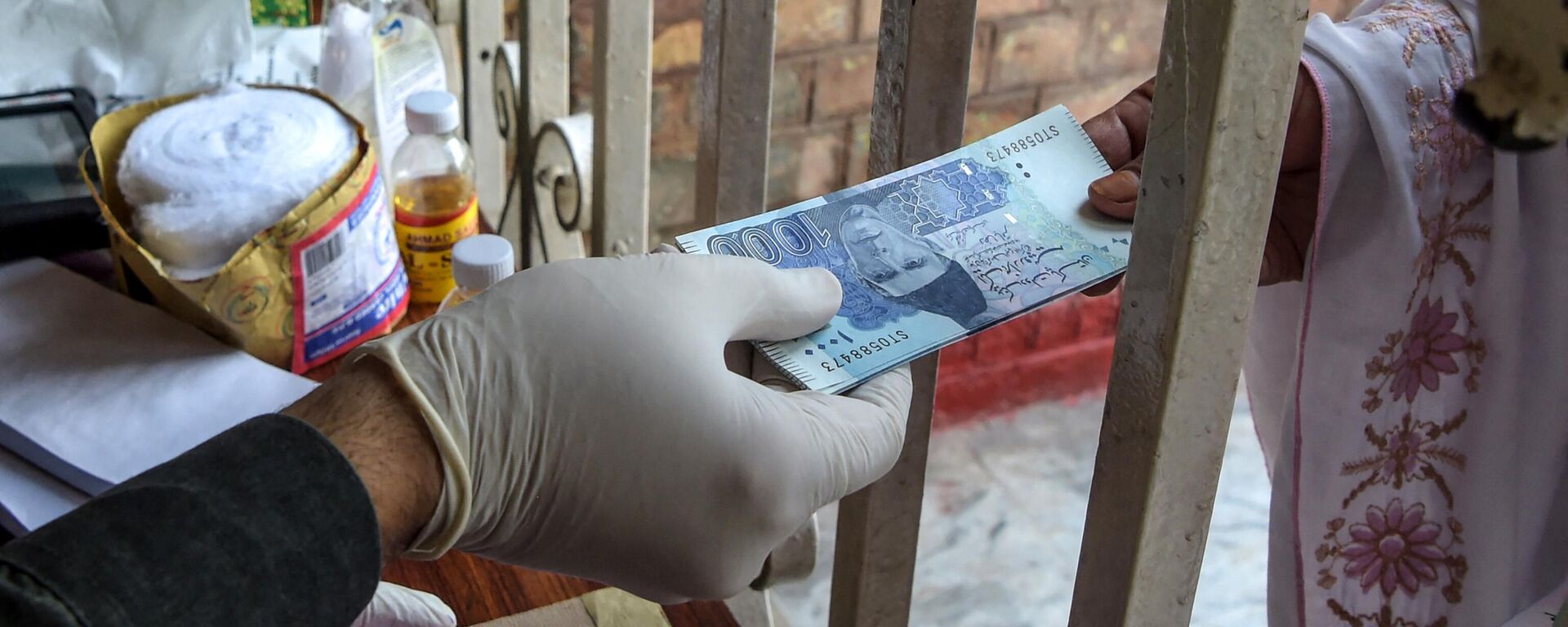https://sputniknews.in/20221228/pakistan-will-not-default-finance-minister-assures-investors-278069.html
Pakistan Will Not Default, Finance Minister Assures Investors
Pakistan Will Not Default, Finance Minister Assures Investors
Sputnik India
Pakistan's economy has been facing significant challenges in recent years, including a high level of debt, declining foreign exchange reserves, and a widening trade deficit.
2022-12-28T14:19+0530
2022-12-28T14:19+0530
2022-12-28T16:53+0530
world news
pakistan
economic crisis
imran khan
shehbaz sharif
https://cdn1.img.sputniknews.in/img/07e6/0c/1c/279967_0:65:3161:1843_1920x0_80_0_0_7eb164b901f036c3bc0d7dacf74bc2ee.jpg
Pakistan's Finance Minister Ishaq Dar on Wednesday reassured investors at the Pakistan Stock Exchange (PSX) that his country would not default on its debt.Dar believes Pakistan has a bright future and strong "economic resilience," despite the economy being trapped in a "tight position" at present.Although Pakistan's foreign exchange reserves have fallen significantly from $24Bln since 2016, when the Pakistan Muslim League-Nawaz (PML-N) government left office, Dar has said that the present economic situation is not his fault.Pakistan now has $6Bln in foreign exchange reserves. Dar attributes the decline to broader systemic issues, calling for efforts to tackle these challenges first to restore consumer confidence.According to Dar, as soon as the date approached for Pakistan to repay its bonds, rumors emerged to the effect that the country would not be able to fulfill its financial commitments.To support his statement, Dar compared Pakistan's debt-to-GDP ratio (72 percent) to that of other countries, including the United States (110 percent), Japan (257 percent), and the United Kingdom (101 percent - after the COVID-19 pandemic).Seeking US Help to Secure LoansPakistan plans to seek the support of the US to use its influence on financial institutions such as the International Monetary Fund to provide loans for approximately two dozen infrastructure projects, with an estimated cost of $13Bln, local media reported.The related document will be submitted at a donors' conference in Geneva on 9 January which is being held for the reconstruction of flood-affected areas in Pakistan.Among the projects is the Flood Protection Project, which is estimated to cost $4Bln and the remaining projects will focus on irrigation and other areas.Earlier this year, catastrophic floods inundated more than half of Pakistan, severely damaging the agricultural economy and the livelihood of millions of people. It is estimated that at least 33 million people have been affected by the floods.
https://sputniknews.in/20221227/deepening-economic-crisis-is-pakistan-facing-a-financial-emergency-274685.html
pakistan
Sputnik India
feedback.hindi@sputniknews.com
+74956456601
MIA „Rossiya Segodnya“
2022
News
en_IN
Sputnik India
feedback.hindi@sputniknews.com
+74956456601
MIA „Rossiya Segodnya“
Sputnik India
feedback.hindi@sputniknews.com
+74956456601
MIA „Rossiya Segodnya“
economic crisis in pakistan, pakistan economic crisis 2022, pakistan finance minister isaq dar, foreign exchange crisis of pakistan, will pakistan default, how much foreign debt pakistan has, why foreign exchange reserves declining in pakistan
economic crisis in pakistan, pakistan economic crisis 2022, pakistan finance minister isaq dar, foreign exchange crisis of pakistan, will pakistan default, how much foreign debt pakistan has, why foreign exchange reserves declining in pakistan
Pakistan Will Not Default, Finance Minister Assures Investors
14:19 28.12.2022 (Updated: 16:53 28.12.2022) Pakistan's economy has been facing tremendous economic challenges recently: a high level of debt, declining foreign exchange reserves, and a widening trade deficit.
Pakistan's Finance Minister Ishaq Dar on Wednesday reassured investors at the Pakistan Stock Exchange (PSX) that his country would not default on its debt.
Dar believes Pakistan has a bright future and strong "economic resilience," despite the economy being trapped in a "tight position" at present.
Although Pakistan's foreign exchange reserves have fallen significantly from $24Bln since 2016, when the Pakistan Muslim League-Nawaz (PML-N) government left office, Dar has said that the present economic situation is not his fault.
“It’s been three months since I took charge and we hear every day that there is going to be a default. How will there be a default? There is no chance that Pakistan will default,” the finance minister assured the investors.
Pakistan now has $6Bln in foreign exchange reserves. Dar attributes the decline to broader systemic issues, calling for efforts to tackle these challenges first to restore consumer confidence.
According to Dar, as soon as the date approached for Pakistan to repay its bonds, rumors emerged to the effect that the country would not be able to fulfill its financial commitments.
“Do not listen to them. Spread the word that Pakistan will not default. I can prove to anyone that Pakistan will not default,” the finance minister maintained.
To support his statement, Dar compared Pakistan's debt-to-GDP ratio (72 percent) to that of other countries, including the United States (110 percent), Japan (257 percent), and the United Kingdom (101 percent - after the COVID-19 pandemic).
“I can give you data about dozens of developed countries that are above 100 percent, but I don’t see alarm all the time that they are under the debt trap or difficulty. Unfortunately, we are our own worst enemy,” Dar said.
Seeking US Help to Secure Loans
Pakistan plans to seek the support of the US to use its influence on financial institutions such as the International Monetary Fund to provide loans for approximately two dozen infrastructure projects, with an estimated cost of $13Bln, local media reported.
The related document will be submitted at a donors' conference in Geneva on 9 January which is being held for the reconstruction of flood-affected areas in Pakistan.
Among the projects is the Flood Protection Project, which is estimated to cost $4Bln and the remaining projects will focus on irrigation and other areas.
Earlier this year, catastrophic floods inundated more than half of Pakistan, severely damaging the agricultural economy and the livelihood of millions of people. It is estimated that at least 33 million people have been affected by the floods.


